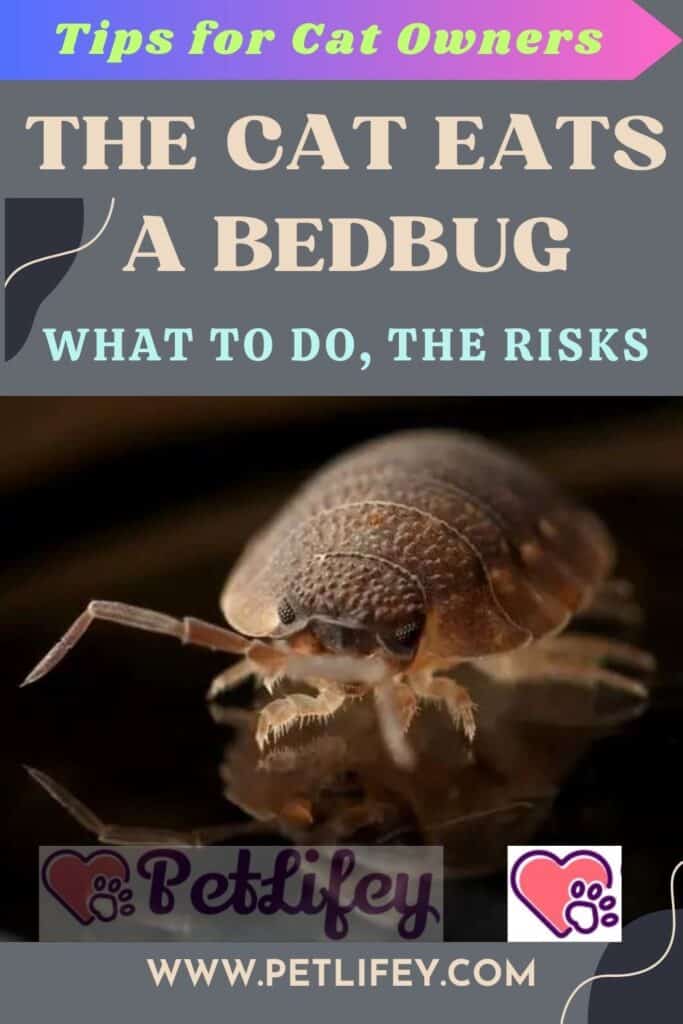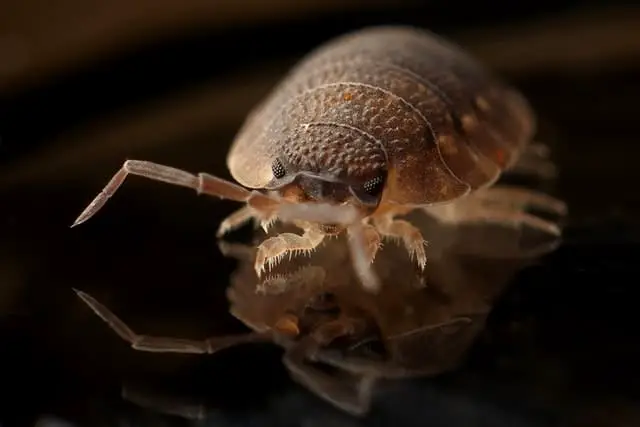
With the summer there is a return not only of sunny days, but also of many annoying insects and parasites. What to do if a cat eats a bedbug?
Whether outdoors or indoors, finding bedbugs lying around can become a nightmare quite quickly if they are not removed. They usually live and spawn in and around beds, or between sofas and computer desks – places where we spend a lot of time at night. And they also target pets and their spaces and objects. Dogs often sniff and find the nests of these insects, but what about cats? And if a cat eats a bedbug, can it be a problem for his health?
What are bedbugs
Bedbugs are small parasites that mainly populate bedrooms (hence their common name “bed bugs” or “mattress bugs”), and that need human blood to survive. Belonging to the Cimex lectularius species, bed bugs are not very active during the day, preferring to remain hidden in their burrows; during the night, however, they come out of their hiding places and go in search of people to suck blood.
The stings, through which insects draw blood, cause small red spots and itchiness, but in addition to the discomfort they cause, they are not particularly dangerous. A bed bug infested home must be checked and disinfected by a pest control expert, otherwise there is a danger that the problem will not be resolved permanently.
Do cats eat bedbugs? Any risks
In short, cats don’t eat bedbugs. They might, however, out of curiosity eat one of these pesky insects, but cats don’t usually tend to eat insects. Although devoid of any appetizing interest, mashing them is a fun pastime for cats, which have always been predators. In fact, if properly trained, cats can also help us win the fight against bed bug infestation in the home.
Dogs can instead use their sense of smell against these parasites. When dogs are used to find bedbugs in homes, they are trained to alert their owners to the presence of their scent. They don’t always find the right location, but they can at least let the homeowner know that they have bed bugs somewhere in their home. Many animals are able to smell insects like these, as they give off a distinct smell. Unfortunately, cats aren’t known to care or worry too much about it.
If we happen to have bedbugs in the house, the chances of the cat interacting with them are not very high. These particular insects move stealthily and make no noise when they come and go from their nest. If a cat manages to spot one, there is a chance it will play with it or try to catch it.
And while cats are known to put all kinds of things in their mouths, not all cats get these insects in their mouths let alone eat them. Bed bugs also give off an unpleasant smell and probably don’t taste too strong, so if your cat eats a bed bug, they will likely spit it out right away and walk away.
Can cats keep bed bugs away?
A cat is very unlikely to help us contain a bed bug infestation, much less get rid of it. This work is often done by dogs and – even – by domestic pigs. Bed bugs primarily target human hosts, as they emit higher levels of carbon dioxide. If a human host is unavailable, they will start targeting other animals such as birds, dogs and – indeed – cats.
The good thing is, it’s very unlikely to see a cat eat a bedbug. In case you happen to catch your cat playing with one of these insects and then eating it, it’s a good idea to have it tested for parasites. Bed bugs can carry and spread Trypanosoma Cruzi, the parasite that causes Chagas disease. While this is very rare, it is best to remove all doubts.
Do bed bugs bite cats?

Okay, let’s reverse the question: Do bed bugs feed on cat blood? In short, bed bugs can do that. In fact, anything that has red blood flowing inside it is a potential prey for these insects.
Our precious little kitty is a prime target. As much as they would like to feast on your kitty, they most likely won’t. Bed bugs have strong claws, that’s true, but not strong enough to burrow through thick hair. For this reason, they will gladly look for other alternative food sources. But when hunger is high and no other food source seems to be in sight, no thick fur will stop them.
Bed bugs are hungry and discriminate nothing, always ready to overcome any obstacle to achieve their reward: blood. We are not safe; not even our furry friend is safe. Here’s how to keep bedbugs away from your kitty – or at least minimize their impact.
- We use a disinfectant on the cat’s cage or basket – disinfecting the cage or basket as often as possible will help us, to some extent. However, we must bear in mind that not all disinfectants will be suitable for the purpose. The wrong disinfectant could suffocate the cat (even lethally), worse, cause a terminal allergic reaction. We choose a disinfectant specially designed to keep bed bugs away.
- Frequent aspiration. Suction is performed to suck up dirt. What many don’t know is that it can also be used to kill pest insects that won’t leave us alone otherwise. Frequent aspiration, not one-time and occasional, is the key to the problem. Also, using the vacuum cleaner completely will help a lot. We lift everything that needs to be lifted, we move everything that needs to be moved until every single parasite is sucked in.
- Hot water wash: Extreme temperatures can kill a bed bug colony in one fell swoop. Once you notice a bed bug bite on your cat, you need to wash their bed regularly with warm water.
- Let’s not forget the spray. Using bed bug spray is a safe and easy way to combat these insects. Of course we must read the label carefully to make sure our pet is safe.






